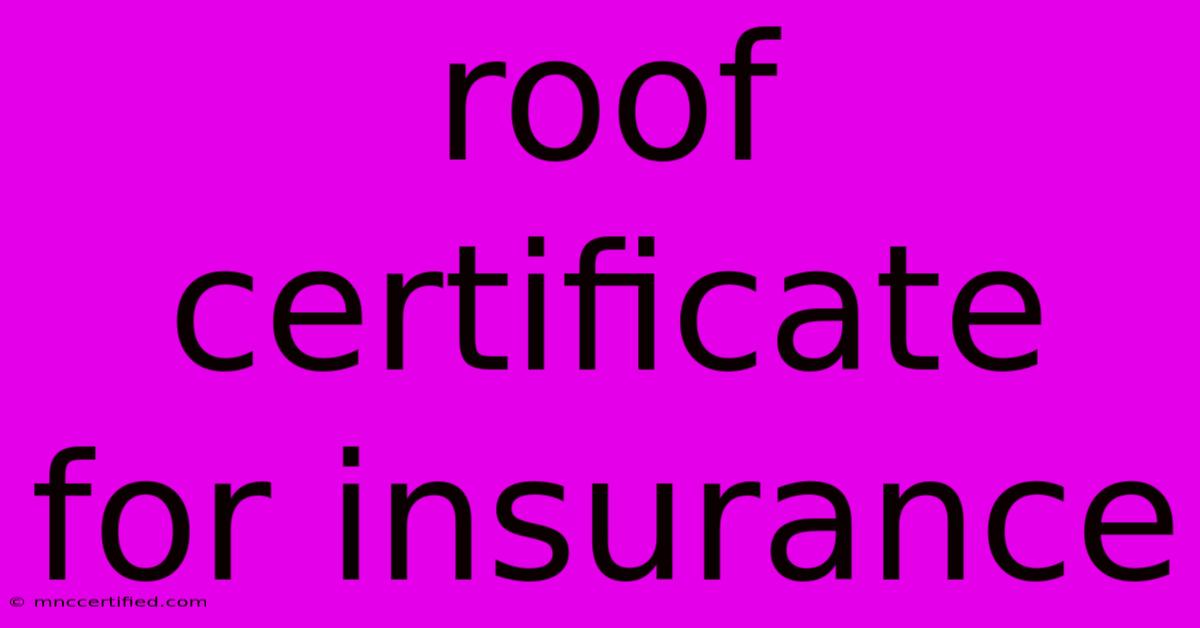Roof Certificate For Insurance

Table of Contents
Roof Certificate for Insurance: Your Guide to Peace of Mind
Getting your home insured can feel like navigating a minefield. One crucial element often overlooked is the roof certificate for insurance. This seemingly small document can be the difference between a smooth claims process and a frustrating battle with your insurer. This comprehensive guide will explain everything you need to know about roof certificates, ensuring you're fully prepared.
What is a Roof Certificate?
A roof certificate, also sometimes called a roof inspection report, is a document prepared by a qualified roofing contractor or inspector. It details the condition of your roof, including its age, materials, and any existing damage. Insurance companies require this to assess the risk associated with insuring your property. Essentially, it provides a professional, unbiased assessment of your roof's health.
Why Do Insurance Companies Need a Roof Certificate?
Insurance companies are in the business of managing risk. A damaged or aging roof significantly increases the likelihood of costly claims, such as those resulting from:
- Wind damage: A weakened roof is more vulnerable to strong winds.
- Hail damage: Hailstones can cause significant damage, especially to older or poorly maintained roofs.
- Water damage: Leaks and other water damage can lead to extensive repairs and mold growth.
By requiring a roof certificate, insurers gain confidence in the condition of your roof, allowing them to accurately assess the risk and set appropriate premiums. A good report can even lead to lower insurance premiums, reflecting the lower risk associated with a well-maintained roof.
What Information is Included in a Roof Certificate?
A thorough roof certificate should include the following information:
- Property address: Clearly identifying the property in question.
- Date of inspection: Indicating when the inspection took place.
- Inspector's name and qualifications: Establishing the credibility of the assessment.
- Roof type and materials: Specifying the roofing material (e.g., asphalt shingles, tile, metal).
- Roof age: Estimating the age of the roof, which is a key factor in assessing its lifespan.
- Condition of the roof: A detailed description of the roof's condition, including any damage, wear and tear, or necessary repairs. This often includes photos.
- Estimated remaining lifespan: A projection of how much longer the roof is expected to last.
- Recommendations for repairs or maintenance: Suggestions for addressing any identified issues.
Missing or incomplete information can invalidate the certificate, so ensure the report is comprehensive and accurate.
How to Obtain a Roof Certificate
Getting a roof certificate typically involves these steps:
- Find a qualified roofing contractor or inspector: Look for licensed and insured professionals with experience in roof inspections. Check online reviews and ask for references.
- Schedule an inspection: The inspector will visit your property to assess the condition of your roof.
- Review the report: Carefully examine the certificate to ensure accuracy and completeness. Don't hesitate to ask questions if anything is unclear.
- Submit the certificate to your insurance provider: Follow your insurer's instructions for submitting the document.
The Importance of Regular Roof Maintenance
Regular roof maintenance is crucial, not just for obtaining a favorable roof certificate, but also for protecting your home and preventing costly repairs. Consider scheduling annual inspections to catch problems early and extend the life of your roof. This proactive approach will save you money in the long run and demonstrate responsible homeownership to your insurance company.
Roof Certificate: A Key to Efficient Insurance
In conclusion, obtaining a roof certificate for insurance is a proactive step that offers significant benefits. It allows for accurate risk assessment, potentially lowers your insurance premiums, and streamlines the claims process should you ever need to file a claim. Remember to choose a qualified inspector, carefully review the report, and maintain your roof regularly to ensure peace of mind and protect your most valuable asset.

Thank you for visiting our website wich cover about Roof Certificate For Insurance. We hope the information provided has been useful to you. Feel free to contact us if you have any questions or need further assistance. See you next time and dont miss to bookmark.
Featured Posts
-
Temp Employee Health Insurance
Nov 27, 2024
-
Supermarket Shortages Hack Attack Impact
Nov 27, 2024
-
Homeowners Insurance Santa Ana
Nov 27, 2024
-
Fact Check Morgan Freemans Hand
Nov 27, 2024
-
Harvey Milk A Political Martyr
Nov 27, 2024